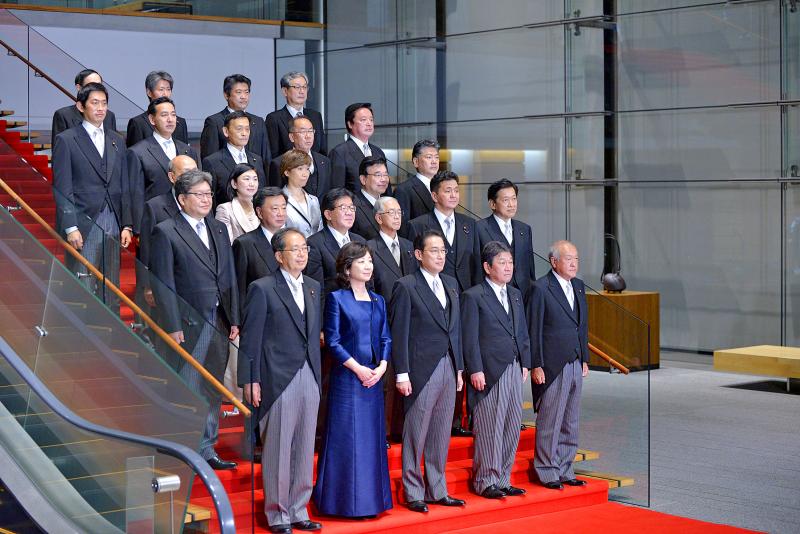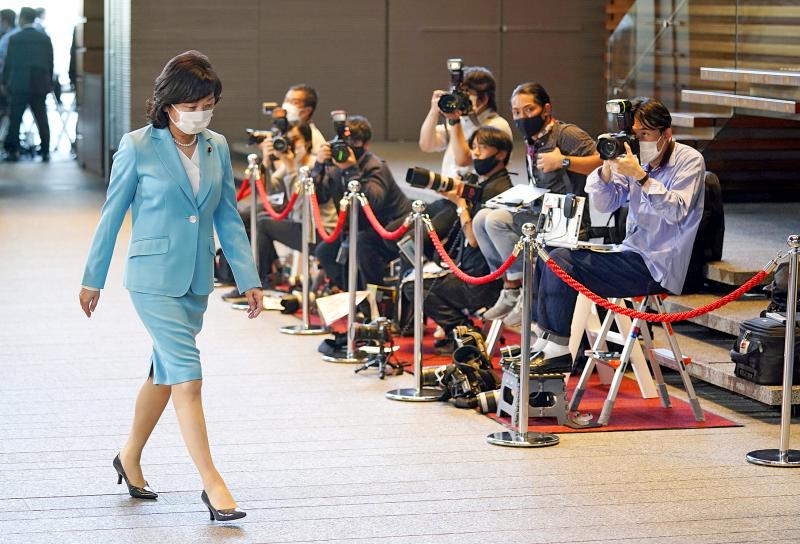Mari Yasuda has come to dread checking her social media accounts. While a TV program has tipped the candidate as “one to watch” in Japan’s general election this month, her anonymous correspondents make no secret of their belief that, as a woman, she should not be standing for parliament at all.
“They accuse me of sleeping with powerful men to get ahead or make abusive comments in calls to our office,” says Yasuda, who is contesting a seat in Hyogo prefecture for the opposition Constitutional Democratic party of Japan. “I receive e-mails from men remarking on my appearance or asking me for a date.”
Sexual harassment is becoming a fact of life for women who run for office in Japan, where female participation in politics is already among the lowest in the world. Despite the recent emergence of diversity and gender as topics of public debate — and signs that voters are more progressive than many of their representatives — the country’s politics have been immune to change, according to Yasuda.

Photo: EPA-EFE
“There are lots of areas of Japanese life in which women are underrepresented and feel unable to express themselves, but it’s particularly prevalent in politics,” she says.
Despite repeated vows by the previous prime minister, Shinzo Abe, during his nine years in office to create a society “in which women shine,” the lower house election on Oct. 31 will add to fears that, in the political sphere, the glass ceiling has only been reinforced.
While the governing Liberal Democratic party (LDP) is widely expected to win — albeit with a reduced majority — the powerful chamber will again be dominated by men.

Photo: EPA-EFE
Of the 1,051 candidates, just 186 — or less than 18 percent — are women, despite the introduction in 2018 of a gender equality law encouraging parties to select similar numbers of male and female candidates. That is slightly fewer than at the previous election in 2017.
“It is almost as if men become MPs by birthright,” says Yasuda, who once campaigned alone but is now accompanied by two colleagues. “If ordinary people felt politics was more relevant to their daily lives, then it would be natural for more women to get elected. But most people feel distant from politicians, as if politics is something for ‘special’ people … in Japan’s case, middle-aged and older men.”
Yoshiko Maeda, a councilor in western Tokyo since 2015, says sexism is not confined to social media. As a member of Japan’s Alliance of Feminist Representatives, Maeda says she has received reports from female politicians across Japan who experience harassment from male colleagues, ranging from heckling during debates to sustained pressure on them to resign. “It is bullying, pure and simple,” she says.
Local councils with just one or a handful of female representatives can be particularly intimidating, says Maeda, who received a stream of online abuse when the alliance called for the removal of a “sexualized” virtual mascot that had been enlisted to promote bicycle safety among schoolchildren in a town near Tokyo.
The atmosphere in council chambers, and well-documented accounts of sexual harassment targeting female politicians and candidates almost certainly puts other women off running for office, she says, although she is quick to point out that she has not encountered gender-based insults in the town she represents.
“Even those who want to get involved in politics often abandon the idea because of opposition from members of their family. There are still so many obstacles to women becoming politicians.”
Earlier this year, the cabinet office revealed that female politicians and candidates encounter “rampant” sexual harassment, including inappropriate touching and verbal advances by male voters. Of the 1,247 female local assembly members surveyed, 57.6 percent said they had been sexually harassed by voters, supporters or other assembly members. Many said they had been targeted with sexually explicit language or gender-based insults.
Harassment aside, the low number of female candidates running in this month’s election is proof that Japan has failed to address structural impediments to getting more women elected to parliament, according to Mari Miura, a professor of political science at Sophia University in Tokyo.
“Incumbent MPs are at a huge advantage in Japanese elections, so as long as the LDP remains by far the biggest party there will be very little change in the makeup of MPs,” Miura says. “That only happens when an opposition party wins.”
The LDP, which is fielding 33 women among 336 candidates in the 31 October election, has not lost a lower house election since 2009 and has governed almost uninterrupted since the 1950s. The result is a chamber packed with men, many of whom, including the current prime minister, Fumio Kishida, are second- or third-generation politicians.
“If an incumbent puts their hand up, they can get priority to become a candidate in the next election,” Seiko Noda, the minister for gender equality, said recently. “Current posts are overwhelmingly filled by men, and the party didn’t go as far as pushing them away to make way for women.”
Japan fairs poorly in international comparisons of female representation, ranking 165th out of 190 countries, with women comprising just 9.9 percent of lower house MPs, according to the Inter-Parliamentary Union. The picture is no different in local politics: just over 30 percent of town and village assemblies have no female representatives, according to 2019 figures.
“In many cases the only way women can win the endorsement of a major party is to go over the heads of the prefectural parties that are in charge of the selection process and use personal networks to appeal to powerful men in the party,” Miura says. “Japan should introduce quotas for female candidates and remove the structural barriers to standing for office. Unless it does that, I can’t see any prospects for change in the near future.”
Kishida, who has promised to redistribute wealth to Japan’s struggling middle class, appointed just three women to his 20-member cabinet and opposes calls to allow married couples to use separate surnames and to legalise same-sex marriages.
“Japanese society is changing,” Miura says, citing growing awareness among younger people of issues such as the climate emergency and gender inequality. “But Japanese politics has stayed exactly the same.”

In the March 9 edition of the Taipei Times a piece by Ninon Godefroy ran with the headine “The quiet, gentle rhythm of Taiwan.” It started with the line “Taiwan is a small, humble place. There is no Eiffel Tower, no pyramids — no singular attraction that draws the world’s attention.” I laughed out loud at that. This was out of no disrespect for the author or the piece, which made some interesting analogies and good points about how both Din Tai Fung’s and Taiwan Semiconductor Manufacturing Co’s (TSMC, 台積電) meticulous attention to detail and quality are not quite up to

April 21 to April 27 Hsieh Er’s (謝娥) political fortunes were rising fast after she got out of jail and joined the Chinese Nationalist Party (KMT) in December 1945. Not only did she hold key positions in various committees, she was elected the only woman on the Taipei City Council and headed to Nanjing in 1946 as the sole Taiwanese female representative to the National Constituent Assembly. With the support of first lady Soong May-ling (宋美齡), she started the Taipei Women’s Association and Taiwan Provincial Women’s Association, where she

Chinese Nationalist Party (KMT) Chairman Eric Chu (朱立倫) hatched a bold plan to charge forward and seize the initiative when he held a protest in front of the Taipei City Prosecutors’ Office. Though risky, because illegal, its success would help tackle at least six problems facing both himself and the KMT. What he did not see coming was Taipei Mayor Chiang Wan-an (將萬安) tripping him up out of the gate. In spite of Chu being the most consequential and successful KMT chairman since the early 2010s — arguably saving the party from financial ruin and restoring its electoral viability —

It is one of the more remarkable facts of Taiwan history that it was never occupied or claimed by any of the numerous kingdoms of southern China — Han or otherwise — that lay just across the water from it. None of their brilliant ministers ever discovered that Taiwan was a “core interest” of the state whose annexation was “inevitable.” As Paul Kua notes in an excellent monograph laying out how the Portuguese gave Taiwan the name “Formosa,” the first Europeans to express an interest in occupying Taiwan were the Spanish. Tonio Andrade in his seminal work, How Taiwan Became Chinese,